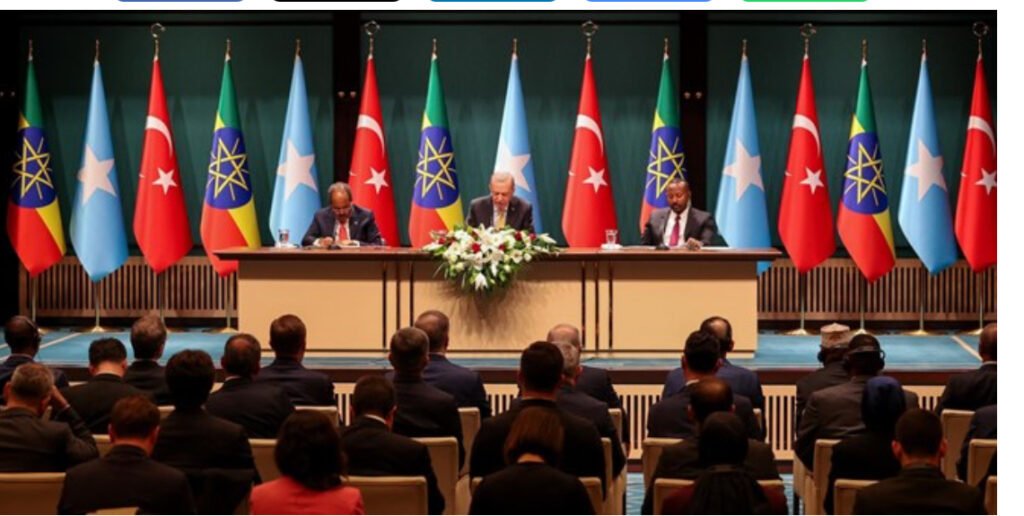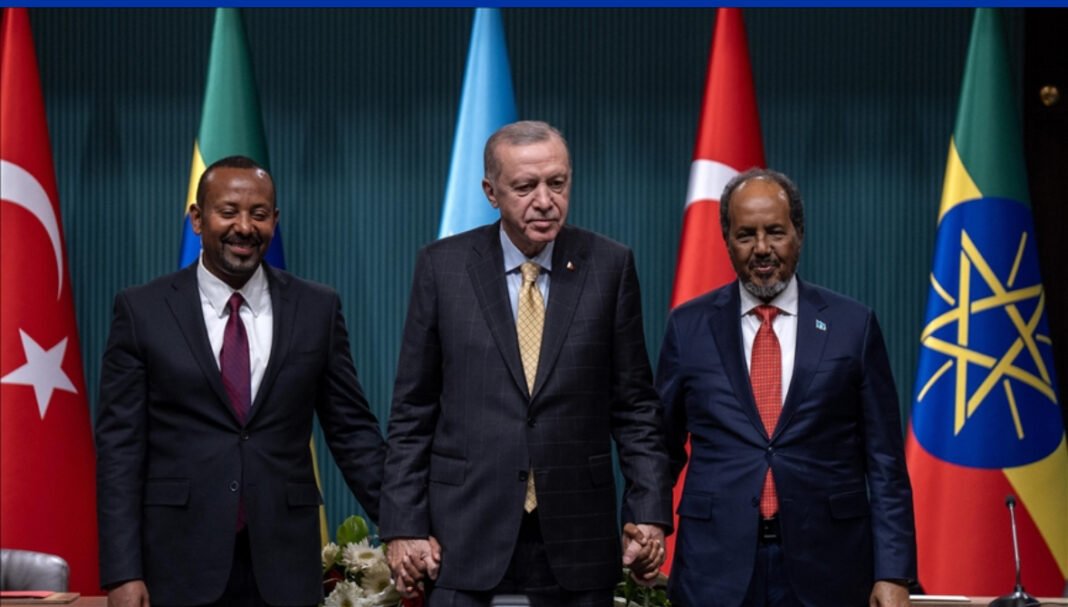By Horn Africa News Staff | Mogadishu
Efforts by Turkey to mediate a growing political rift between Somalia and Ethiopia have effectively collapsed, marking a major setback in diplomatic attempts to stabilize the increasingly fragile Horn of Africa.

Launched in early 2024, the Turkish-led mediation was intended to ease tensions stemming from Ethiopia’s controversial memorandum of understanding (MoU) with Somaliland—a self-declared autonomous region that Somalia regards as an inseparable part of its sovereign territory. The MoU, signed in January 2024, would grant Ethiopia access to the Red Sea through Somaliland’s coastline, a move strongly condemned by Mogadishu as a violation of Somalia’s territorial integrity.
While Ankara initially positioned itself as a neutral and strategic intermediary—given its strong diplomatic and economic ties to both Ethiopia and Somalia—talks have since broken down. According to diplomatic sources, the negotiations stalled due to deep-seated mistrust, competing national interests, and the absence of meaningful compromises from either side.
Talks Stall, Tensions Rise
The dialogue, hosted quietly in Ankara, had raised cautious optimism when first announced. However, by mid-2025, there has been no progress, no public updates, and no scheduled future meetings. Officials from both Mogadishu and Addis Ababa have remained largely silent, but diplomatic indicators and recent political statements suggest the talks are over in all but name.
The core issue remains Ethiopia’s pursuit of maritime access—a goal Prime Minister Abiy Ahmed has called “a peaceful and sovereign strategy.” In an address to Ethiopia’s parliament on July 3, Abiy reaffirmed his government’s commitment to the Somaliland deal, stating that “Ethiopia has the right to seek strategic access to the sea in the interest of our national development.”
Somalia, however, sees the agreement as an unacceptable breach of international law and a dangerous precedent that undermines the country’s unity. President Hassan Sheikh Mohamud’s administration has been engaged in a robust diplomatic campaign to pressure the international community to reject the MoU and affirm Somalia’s territorial claims.
“The Somali government considers any attempt to legitimize Somaliland’s unilateral actions a red line,” a senior Somali official told [News Organization] under condition of anonymity. “Without the withdrawal of that agreement, there can be no meaningful dialogue.”
Turkey’s Role in Question
Turkey had hoped to use its trusted status in the region—built on years of humanitarian, military, and economic cooperation—to facilitate a peaceful resolution. But the collapse of the mediation raises questions about Ankara’s influence in regional geopolitics and highlights the limits of external mediation in deeply entrenched territorial disputes.
Analysts say Ankara underestimated the depth of national identity and sovereignty issues at play.
“Turkey’s initiative was well-intentioned but ultimately could not bridge the gap between two fundamentally opposing national visions,” said Dr. Elif Kaya, a political analyst specializing in Horn of Africa affairs at Istanbul University. “Without serious international pressure or incentives, both sides have little reason to compromise.”
Regional Powers Step In
The breakdown of mediation comes as other regional and international actors step up their involvement in the Horn. On July 6, Egyptian President Abdel Fattah el-Sisi reiterated Cairo’s concern over Red Sea security and pledged increased military support for regional allies.
During a high-profile meeting in the coastal Egyptian city of El Alamein with Somali President Hassan Sheikh Mohamud, the two leaders emphasized strategic cooperation and called for respect for Somalia’s sovereignty. El-Sisi’s comments are widely seen as a rebuke to Ethiopia’s actions—not only in the Somali context but also in the broader context of Nile Basin politics, where Ethiopia’s Grand Renaissance Dam project has strained relations with Egypt and Sudan.
The alignment between Cairo and Mogadishu may signal a new regional axis aimed at countering Ethiopia’s rising assertiveness.
Uncertain Future
With no clear path forward, Turkey’s mediation now appears to be another casualty of the complex and competitive politics of the Horn of Africa. The breakdown leaves unresolved questions about Somaliland’s recognition, Ethiopia’s maritime ambitions, and Somalia’s quest for national unity—issues that continue to destabilize the region.




